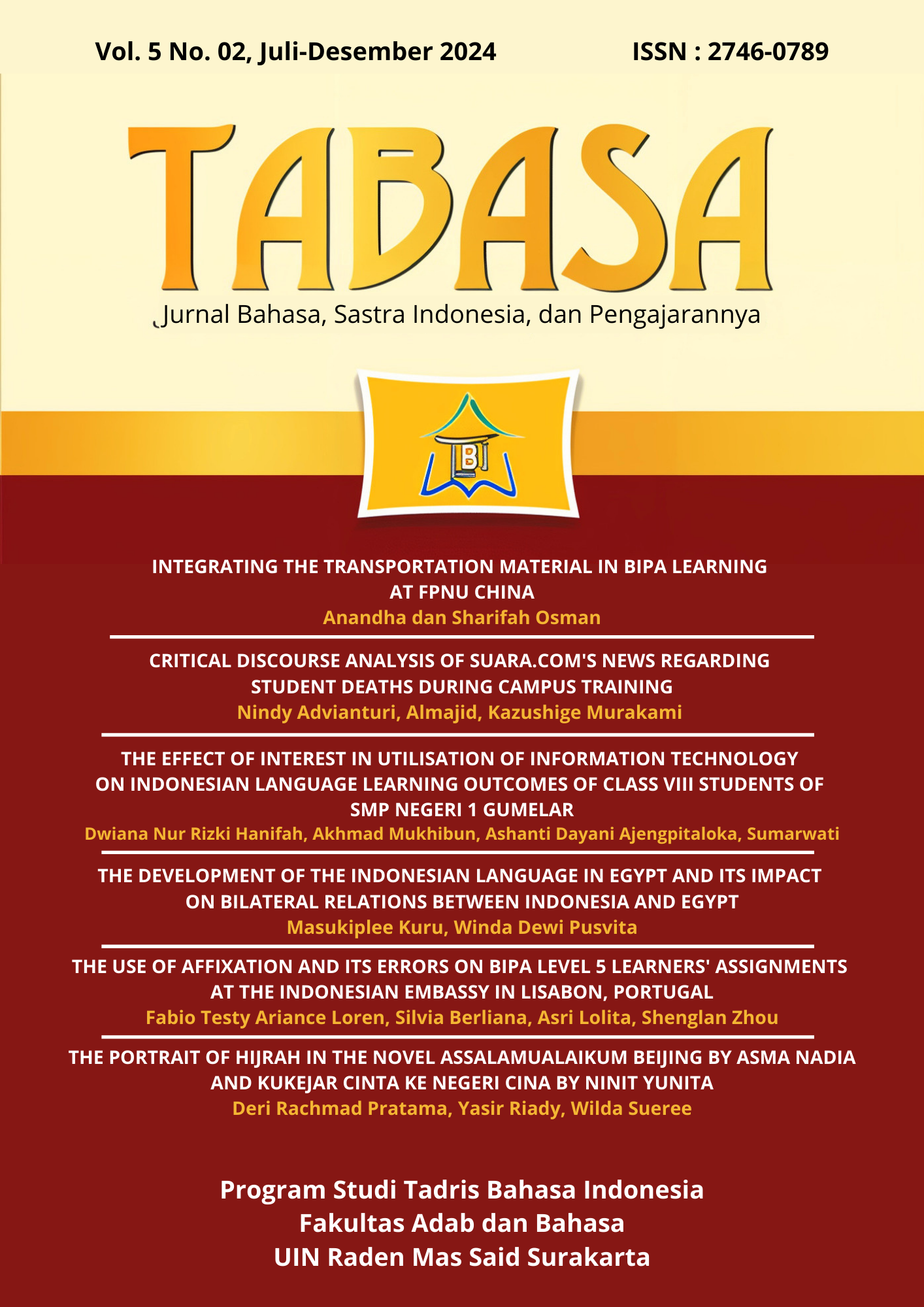The Use of Affixation and Its Errors on BIPA Level 5 Learners' Assignments at the Indonesian Embassy In Lisabon, Portugal
DOI:
https://doi.org/10.22515/tabasa.v5i02.10119Keywords:
Affixation, Assigment, BIPA Learner, ErrorAbstract
This research discusses the affixation found in the weekly assignments of Indonesian language learners for Foreign Speakers Level 5 at the Embassy of the Republic of Indonesia in Lisbon, Portugal. This study aims to describe the usage and errors of affixation in the weekly assignments of Indonesian language learners for Foreign Speakers Level 5 at the Embassy of the Republic of Indonesia in Lisbon, Portugal. The method used is a qualitative descriptive method. The data in this study consists of forms and errors of affixation. The data collection techniques employed are interviews and documentation techniques. The results of this study include the use of affixation in the form of: 1) Prefixes, 2) Suffixes, 3) Infixes, and 4) Circumfixes. Using prefixes amounts to 317 data points, suffixes to 27 data points, infixes to 1 data point, and circumfixes to 70 data points. Furthermore, the errors in affixation include: 1) Prefixes, 2) Suffixes, and 3) Circumfixes found in the weekly assignments of BIPA level 5 learners at the Indonesian Embassy in Lisbon, Portugal, in 2023. The errors found in the weekly assignments of BIPA level 5 learners at the Indonesian Embassy in Lisbon include 23 errors with prefixes, 7 errors with suffixes, and 2 errors with circumfixes. It is hoped that the results presented will serve as a reference for BIPA instructors to understand which affixations are frequently used and which ones often lead to errors by BIPA learners.
Downloads
References
Abubakar, R. (2021). Pengantar Metodologi Penelitian. SUKA-Press UIN Sunan Kalijaga.
Amin, K. F., & Artikel, I. (2021). PENGAJARAN BAHASA INDONESIA UNTUK PENUTUR ASING (BIPA) DAN PENGENALAN BUDAYA LOKAL BUGIS-MAKASSAR. Jurnal Pendidikan Indonesia, 2(6).
Ariyani, F., & Megaria. (2018). MORFOLOGI BAHASA INDONESIA (1st ed.). GRAHA ILMU.
Burkart, J., Guerreiro Martins, E., Miss, F., & Zürcher, Y. (2018). From sharing food to sharing information. Interaction Studies. Social Behaviour and Communication in Biological and Artificial Systems, 19(1–2), 136–150. https://doi.org/10.1075/is.17026.bur
Chaer Abdul. (2015). MORFOLOGI BAHASA INDONESIA (Pendekatan Proses) (2nd ed.). PT RINEKA CIPTA.
Enggarwati, A., & Utomo, A. P. Y. (2021). Fungsi, Peran, dan Kategori Sintaksis Bahasa Indonesia dalam kalimat Berita dan Kalimat Seruan pada Naskah Pidato Bung Karno 17 Agustus 1945. ESTETIK : Jurnal Bahasa Indonesia, 4(1), 37. https://doi.org/10.29240/estetik.v4i1.2209
Fauzi, A., Nisa, B., Napitupulu, D., Abdillah, F., Gde Satia Utama, A. A., Zonyfar, C., Nuraini, R., Silvi Purnia, D., Setyawati, I., Evi, T., Dian Handy Permana, S., & Susila Sumartiningsih, M. (2022). METODOLOGI PENELITIAN.
Hardini, T. I., Yulianeta, Y., Fikrianto, M., Hamidah, H., Emilia, E., & Kharismawati, L. R. S. (2023). ASEAN Students’ Interest in Learning the Indonesian Language: A Descriptive Study from the Perspective of SEAMEO ASEAN. International Journal of Language Education, 7(4), 746–762. https://doi.org/10.26858/ijole.v7i4.59491
Isni Nurrahmi, N., & Rahmawati, E. (2021). ANALISIS KESALAHAN BERBAHASA PADA PENULISAN AUTOBIOGRAFI KARYA MAHASISWA PROGRAM STUDI TADRIS BAHASA INDONESIA IAIN SURAKARTA. Tabasa: Jurnal Bahasa, Sastra Indonesia, Dan Pengajarannya, 2(1). http://ejournal.iainsurakarta.ac.id/index.php/tabasa
Istanti, W., Seinsiani, I. G., Visser, J. G., & Lazuardi, A. I. D. (2020). Comparative analysis of verbal communication vocabulary between indonesian-afrikaans for foreign language teaching. International Journal of Language Education, 4(3), 389–397. https://doi.org/10.26858/ijole.v4i3.15106
Kemendikbudristek. (2023, April 3). Tiga Fokus Utama Program Prioritas Bidang Kebahasaan dan Kesastraan. Kementrian Pendidikan Dan Kebudayaan.
Khalimatussa’diyah, Mulyaningsih, I., & Itaristanti. (2023). KESALAHAN BERBAHASA INDONESIA PADA PENULISAN TEKS EKSPLANASI KARYA SISWA KELAS VIII MTS PLUS AL BUKHORI KABUPATEN BREBES. Tabasa: Jurnal Bahasa Sastra Indonesia Dan Pengajarannya, 3. https://ejournal.uinsaid.ac.id/index.php/tabasa
Kim, J. (2022). Korean EFL Students Building and Sustaining New Perspectives through Global Literary Texts. Sustainability (Switzerland), 14(3). https://doi.org/10.3390/su14031372
Mahriyuni, M., Pramuniati, I., & Sitinjak, D. R. (2024). Interlanguage development among the learners of Indonesian language in Paris. Indonesian Journal of Applied Linguistics, 14(1), 206–219. https://doi.org/10.17509/ijal.v14i1.70394
Moya-Santiagos, P., & Quiroga-Curín, J. (2022). An overview of Indigenous peoples in Chile and their struggle to revitalise their native languages: the case of Mapudungun. London Review of Education, 20(1). https://doi.org/10.14324/LRE.20.1.10
Muliastuti, L., Mayuni, I., Nurhaina, A., & Saddhono, K. (2023). Tailoring CEFR to BISOL (Bahasa Indonesia for Speakers of Other Languages) : A Model for Integrative Language Teaching Materials. International Journal of Language Education, 7(4), 590–601. https://doi.org/10.26858/ijole.v7i4.53219
Nafis, H., Yustanto, ; Henry, Wakit, ;, & Rais, A. (2023). The Influence of Language Attitudes on Indonesian Language Proficiency of BIPA Learners in Semarang City. International Journal of Multicultural and Multireligious Understanding, 10. https://doi.org/10.18415/ijmmu.v10i8.5085
Pangestu, M. H., Juniarta, P. A. K., & Mahendrayana, G. (2022). The Implementation of Process Based Approach in Teaching Writing on The Tenth Grade Students in Senior High School. INDONESIAN JOURNAL OF EDUCATIONAL RESEARCH AND REVIEW, 5, 100–110. https://doi.org/10.23887/ijerr.v5i1
Pratami, F. (2023). PROSES AFIKSASI PADA CERPEN MATA YANG ENAK DIPANDANG KARYA AHMAD TOHARI. Seulas Pinang: Jurnal Pendidikan Bahasa Dan Sastra Indonesia, 5(1), 48–56.
Pratiwi, Y., Andajani, K., Suyitno, I., Ismail, A., & Prastio, B. (2023). Representing and Implementing Moral Values to Foreign Students in Indonesian Textbooks for Learners Other Than Indonesians. International Journal of Language Education, 7(1), 58–76. https://doi.org/10.26858/ijole.v1i1.36256
Silmi Faiza dan Rosida Erowati, F. (2021). TINGKAT KEMAMPUAN BERBICARA PEMELAJAR BIPA (BAHASA INDONESIA PENUTUR ASING) TINGKAT PEMULA MENGGUNAKAN TES TEKS DESKRIPSI. Tabasa: Jurnal Bahasa Sastra Indonesia dan Pengajarannya, 2.
Sugiyono. (2022). Metode Penelitian Kuantitatif, Kualitatif, dan R&D (Sutopo, Ed.; 4th ed.). ALFABETA.
Wahyuni, D., Maulina, Y., Mulia, A., & Sunardi. (2021). Cultural Discourse in Reading Texts of Indonesian Language Proficiency Test. International Journal of Language Education, 5(4), 356–371. https://doi.org/10.26858/ijole.v5i4.23590
Downloads
Published
How to Cite
Issue
Section
Citation Check
License
Copyright (c) 2024 Fabio Testy Ariance Loren, Silvia Berliana, Asri Lolita, Shenglan Zhou

This work is licensed under a Creative Commons Attribution-NonCommercial 4.0 International License.
Authors retain copyright and grant the journal right of first publication with the work simultaneously licensed under a Creative Commons Attribution License that allows others to share the work with an acknowledgement of the work's authorship and initial publication in this journal.
This ejournal system and its contents are licensed under
a Creative Commons Attribution-NonCommercial 4.0 International License










